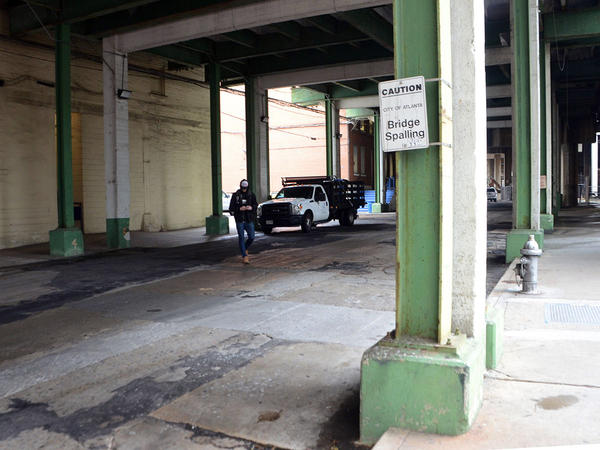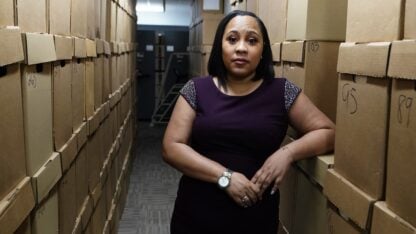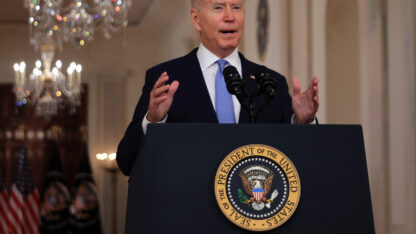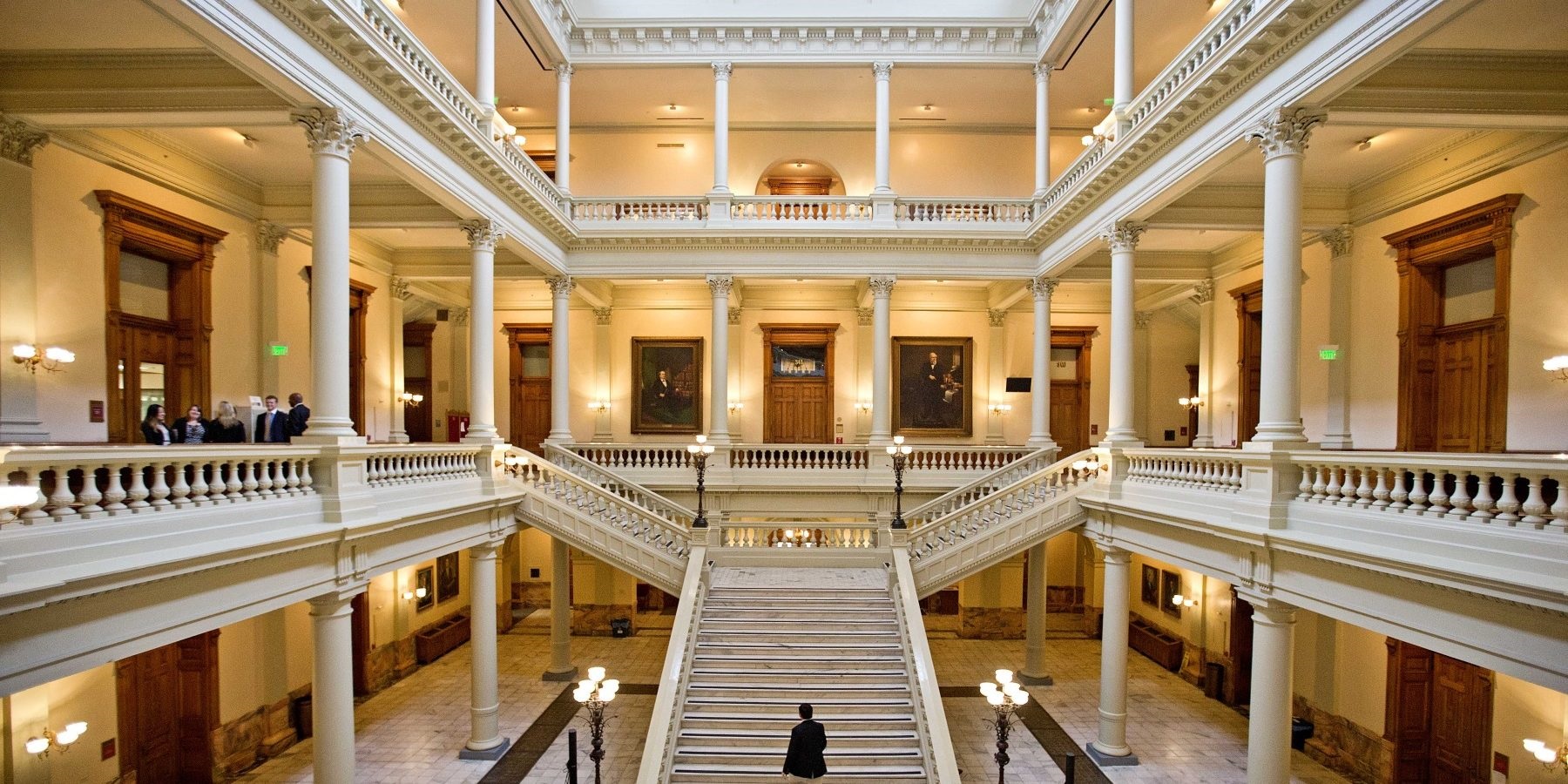Some Still Grappling With Concerns Heading Into Atlanta Infrastructure Vote

Atlanta residents generally agree there’s a big need out there. Huge potholes, cracked sidewalks and crumbling bridges are all readily apparent.
Atlantans will soon decide how much they want to fix the problem. Tuesday, the city is holding a referendum on a $250 million bond package for infrastructure improvements. Some, however, remain concerned about green-lighting so much money.
Like almost everyone in the city, Derrick Bambach is fed up with traffic. Making matters worse, he says, is Atlanta’s new streetcar system. He thinks the money should have gone elsewhere.
“I live downtown. Transportation infrastructure is very important to me. Every single thing I ever see that gets done is to benefit tourist traffic and sports team fan traffic and not actual residents,” Bambach said.
He wants improvements but questions the city’s priorities. It’s why he’s concerned the referendum project list still isn’t finalized.
“I’m cautious about giving large chunks of unusual money. It’s like the regular budget and then these other big chunks of money. I’d probably be less likely to go out of my way to vote for it,” Bambach said.
Polling suggests Atlantans will likely approve the bond package, but many still have reservations.
“Because of the lack of transparency in the city of Atlanta with many budget items, with many processes, I think it should be a huge concern for residents,” William Perry, the head of the government watchdog group Common Cause Georgia, said.
Perry has been a frequent critic of Mayor Kasim Reed. In the past, he’s taken Reed to task over perceptions of pay-to-play for airport concession contracts ─ an accusation the mayor strongly denies. He’s railed against a set of controversial payouts to senior Reed staffers. And he’s protested the use of city dollars to help build the new Atlanta Falcons stadium.
“Why weren’t these crumbling roads and bridges more of a priority when we committed so many funds to the Falcons stadium? With all the issues the city has faced I just don’t see how we can trust them to spend this money correctly,” Perry said.
Mayor Reed says he understands concerns about the unfinished project list, but he points to the city’s overall infrastructure backlog, which is nearly $1 billion. With that much need, he says, it’s pretty clear how the money will be spent.
“They really aren’t great mysteries,” Reed said. “If we take care of some basics, it’s going to go pretty quickly. If we repair our four bridges that are in critical condition, do traffic light synchronization, do road repairs, and the major repaving that we need, you’re a pretty long way through the infrastructure bond.”
The referendum is split into two questions. One would approve about $190 million for transportation-related projects. A separate question would okay roughly $60 million for various facility upgrades. The upgrades include renovating an indoor swimming pool near the Martin Luther King memorial site and public art projects. Reed is a strong proponent of both.
“Once you get past what’s urgent, then there’ll be some give and take. But that’s only about 10 to 15 percent,” said Reed.
That would mean millions are still in play.
Reed insists the city will use those funds wisely. He says he has a proven track record of balanced budgets and good financial stewardship. Credit rating agencies have generally agreed.
“While I certainly understand people having concerns, we’ve done a lot right,” Reed said. “In an organization with 8,500 people, in one of the largest cities in America, there will always be things to point out, and hopefully when you all point them out we’ll take the feedback seriously and try to get better at it.”
But the city’s overall receptiveness to feedback has come under question before.
Over the years, City Auditor Leslie Ward has issued several reports involving the misuse of taxpayer dollars. One had to do with discretionary spending by City Council members. Her report called for stricter rules, but the recommendations have been largely ignored.
In 2014, the city’s ethics office launched investigations into two council members – Cleta Winslow and Michael Julian Bond. The investigation into Councilman Bond found more than a dozen spending violations.
“I can’t say for sure that nobody else does it, but I’ve worked in other cities where nothing like this was allowed to happen,” Ward said last May while speaking generally about council spending.
Ward has also drawn attention to security and management issues at the city’s Watershed and Public Works departments. In recent years, hundreds of thousands of dollars of city equipment has simply disappeared.
In the Watershed case, rank-and-file employees brought the issue to light ─ not management nor elected officials. Last August, the city fired more than a dozen Watershed employees, but wouldn’t explain the reason for the decision. Since then, Mayor Reed has stood by the department’s embattled commissioner.
Gina Pagnotta-Murphy, the head of one of Atlanta’s employee unions, says workers still have a lot of concern about who’s running the city.
“There is a lack of trust about expenditures. We know there’s been bad management,” Pagnotta-Murphy said. “There’s been missing some money in the past. Employees do have a distrust going forward, and we’ve got to find a way to fix that. How do we fix that? I don’t know the answer.”
In any case, several council members say they’re disappointed voters won’t have a finalized project list. Alex Wan, the chair of the council’s finance committee, thinks it would have eased some concerns. But like the mayor, Wan insists there’s not much wiggle room with the bond money. He expects voters to support the plan.
“They understand the need, and they understand this is just a first step,” Wan said. “That it’s not going to address everything that they want to see, but it’s a much needed start. And perhaps that overcomes whatever level of discomfort that they have on the trust side.”
City officials say the 200 or so infrastructure projects, if approved, will be hashed out in the coming months. The tentative timeline for those projects to be completed is five years.
Wan and others stress safeguards are in the works. Three council members are pushing separate plans to create oversight committees. Independently, Mayor Reed says he’ll appoint his own oversight committee.
Those safeguards, however, have yet to be finalized.
9(MDAxODM0MDY4MDEyMTY4NDA3MzI3YjkzMw004))








